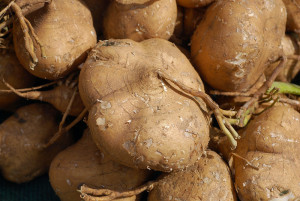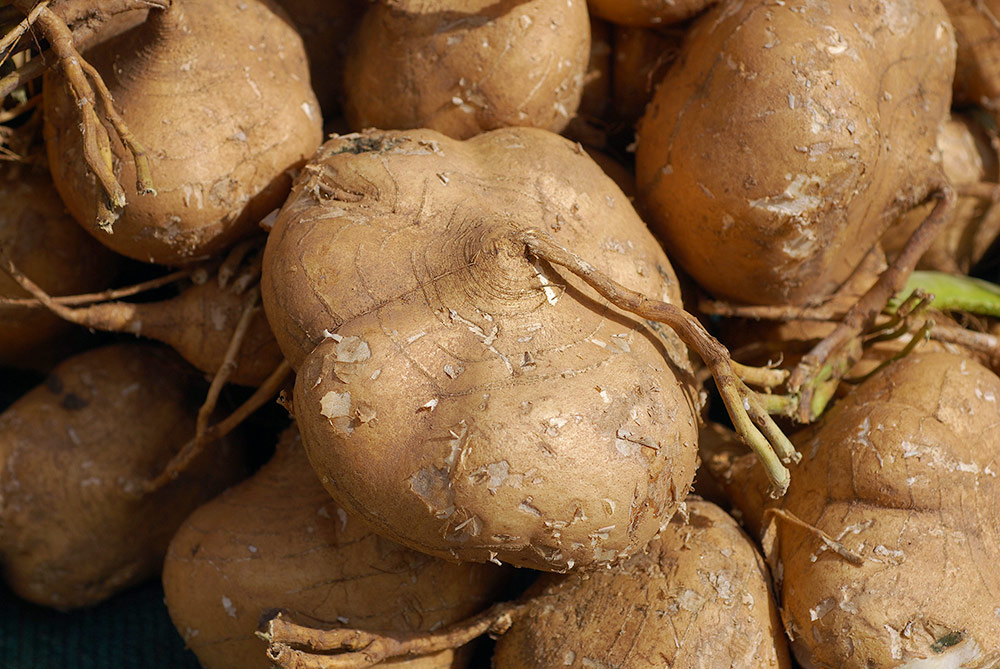
Jicama, also well-known as yam bean, is a fleshy, round taproot vegetable. Other names for Jicama are yacon, Mexican water chestnut, Seng Kwang, Mexican turnip, etc. and in Latin, it’s pronounced as hecama.
This crispy, ice-white, refreshing and fruity-flavored tuber may be cooked in much sweet and savory way or eaten raw. This root vegetable is popularly grown in several parts of Andean South America, Central America, the Caribbean, and South Asia.
A medium-sized cup serving of raw jicama offers:
- Calories – 46
- Carbohydrate – 10.6 grams
- Fiber – 5.8 grams
- Protein – 0.86 grams
- Total Fat – 0.11 grams
Among the many health benefits of Jicama are listed below:
- Boosts the immune system
Jicama is an excellent source of Vitamin C. Every 100-gram serving contains 34% of the daily recommended Vitamin C. Since jicama is full of Vitamin C, it also has antihistamine properties and improves immunity. Additionally, it has anti-inflammatory capabilities and is great for individuals with asthma or for those who regularly get colds and flu. This tuber helps to reduce wheezing, which is a symptom of asthma attacks. In addition, because jicama is rich in Vitamin C, it’s also great for the skin and eyes.
- Enhances Brain Function
Vitamin B6 has been associated with improving brain functioning and cognitive capabilities, and jicama is full of Vitamin B6. Vitamin B6 is vital for the breakdown of proteins to amino acids, and other types of protein found in humans. This helps in maximizing the process of metabolism and efficiency of different body organs.
- Promotes Strong Bones
Jicama is also full of vitamins like copper, iron, magnesium, and manganese; these minerals help to improve the density of bone minerals. This group of minerals is also vital for the building of bones and healing bone damage. The minerals found in jicama also helps prevent the onset of osteoporosis, a common condition that many are suffering from.
- Lowers Cholesterol Levels
High levels of cholesterol sometimes result to poor eating habits, which is a problem for a lot of people who have serious health disorders like hypertension and heart attack. It has been proven that those who eat lots of fiber have lower chances of having high levels of cholesterol in the blood. A diet rich in fiber is recommended for people who have high cholesterol levels since fiber has a potent negative effect on the levels of cholesterol. Jicama is a great source of fiber, which helps in reducing levels of cholesterol and stabilizing blood sugar levels.
- Lowers Homocysteine Levels
Homocysteine is an amino acid, which is an independent factor of cardiovascular disease. Furthermore, homocysteine that is found in meat products is associated with diseases of the kidneys. Jicama has an anti-homocysteine property, so it lowers amino acid levels, as a result, lowers the chances of heart and kidney disease.
- Reduces Risk of Capillary Damage
Jicama can help in strengthening the structures of capillaries, lowering the chances of having your capillaries being damaged or broken. Individuals who regularly eat jicama have roughly 11% homocysteine levels lower as compared with those who don’t eat jicama at all.
- Delays Cell Damage
The USDA Food and Nutrition Service said that white-fleshed veggies like the jicama are good sources for phytonutrients. These chemicals are found in plants that have a potent antioxidant capability. According to the American Dietetic Association, they were able to stop the capability of unstable free radicals from damaging your cellular tissues or DNA. Intake of foods high in antioxidant may lower your risk of acquiring cardiovascular disease, cancer, diabetes, cataract, and Alzheimer’s disease.
- Aids weight loss
For those trying to lose a few pounds or maintaining weight, jicama’s health benefits can also help lower daily calorie intake. Since jicama has low-calorie levels – every 100-gram serving has three calories – it is a great choice for individuals who want to shed some weight.
Only the root of the jicama is edible while the rest of is extremely poisonous. So, take extra care not to consume the leaves, vines, and seed pods. Well other than that, jicama is a healthy vegetable that provide a lot of healthy benefits.

